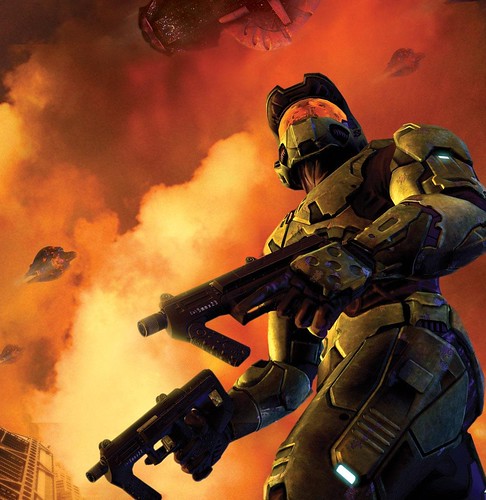
In the final installment of my interview series with Marty O’Donnell, we talk about the effect that instrumentation has on musical themes and development, and I ask him one final question, what gets him out of bed in the mornings.
Marty: So it turned out that in Halo 2 there was sort of what developed into the covenant theme and I think it was the music that came in when the arbiter was introduced… and it tended to feel like the arbiters theme. But it felt more like ‘this is the somber alien, this has to do with the emotion of what is happening over there’ and that emotion worked several times through the game for me, so it wasn’t necessarily the covenant theme. I never developed the theme of the covenant, but it sorta turned out almost like that.
Ben: So you say you never wrote a covenant theme, but it seems to me like there’s definitely a 'covenant' type of instrumentation. Was that a deliberate thing?
M: It’s sorta like what you were saying before, there are a lot of different techniques and I tend to want to not be stuck on one, so sometimes it’s a musically thematic thing sometimes it’s just the colour of the instruments that are being used and then that’s what becomes sort of iconic throughout.
Lots of different thing work, and I don’t like to limit myself to only one way of working. It sort of self limits when you start really putting it together, you start saying, well I’m not going to do this even thought that could work, because this other thing has already become more interesting to me, so I’ll just narrow it down to just these three kind of approaches, and at the end of the day you look back and it almost looks like I planned the whole thing.
B: *laughs* Well it really does, I’m listening through it and going ‘hang on a minute there’s all these covenant sounds and they all sound like the covenant instrumentation!’
M: *laughs* Yeah it’s probably true, but it wasn’t something I planned ahead of time, it’s a little bit more organic. As you start throwing things together, certain things kinda work and stick so you stay with it, and you realize at the end maybe it was meant to be that way or… I don’t know how to put it, it’s never something I plan ahead of time, like ‘this is the way it will end up’, maybe it’s just my approach to composition, I tend to be more in the moment and say ‘hey this is working, I like this’ and then look back at what I’ve done and realize ‘oh there’s almost a plan here or there’s definitely a theme that’s building that I didn’t really know was going to be there ahead of time. But I sort of anticipate that it probably will be that way by the time I’m done.
B: Yes, I think that’s probably how I work as well. One of our lecturers at Uni always goes on about compositions being organic and having a natural development. I got into my degree as a singer, and so all my music training and knowledge was gained by ear, so I tend to evaluate whether it works on not by listening rather than dots on the page.
M: Yeah I think that’s great, that’s where it counts.
B: So I think that’s all of the questions I had planned to ask, except for one last question. I wanted to ask you what’s the most exciting thing that’s happening in music in games. What gets you out of bed in the morning to come to work after 10, 12 or 15 hours of crunch?
M: *laughs* Well that’s interesting…I would say, in general, the reason that I’m in the game business… I think it’s an artistic medium that’s still early in the development phase. And as a creative person who likes working in a place that is somewhat unexplored that is very exciting to me. There’s a lot of other places you can do music, but music in games still I think has just a huge unknown path before it. I have no idea where it’s really going to go. Games as a medium in general are still potentially in their infancy. I find it would have been really fascinating to have been a filmmaker in the 1920’s because it was so early on and things moved so amazing over the, from 29-39 it was just an amazing ten year period, and I think we’re sort of in that period. The mid 30’s in the film industry is where we are in the games industry. I think 5 years from now games are going to be vastly more improved, and improved as an artistic expression. And so I would encourage anybody who likes creating in a places that still has unexplored paths, I think games are probably the place to be.
Thanks again to Marty for being a part of my thesis and for being so generous with his time, and thanks to everyone for reading this rather epic series. Parts 1 through 7 can be found here.

2 comments:
It's so interesting to hear about this end of game development. Great stuff Ben, all the way through. Any chance you'll be interviewing other musicians in the game industry? I'd love to see someone pick Jesper Kyd's brain.
This was a great series, I thoroughly enjoyed all of it.
Post a Comment